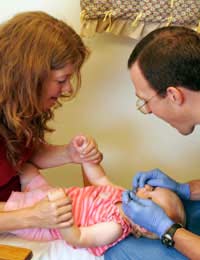Dental Care For Infants and Toddlers

Most dentists agree that dental care for infants and toddlers should begin before the first tooth has even appeared. Tooth decay can start from the day the first tooth erupts and it is very important to make sure that a gum and teeth cleaning routine is implemented in order to minimise decay.
The First Dental Visit
Opinions vary between dentists on the best age for a child's first visit to the dentist but as the first tooth will erupt anywhere from six to twelve months, then the earlier the better. Regular dental visits should occur at least six months after the first tooth has appeared, but a visit to the dentist before this is recommended. The dentist will be able to give advice on the correct way to clean baby teeth and also nutritional information that will help keep teeth strong, healthy and free from decay.There are no, set in stone rules for the eruption of baby teeth, but teething will begin around six months and the full set of teeth should have appeared by the age of three years. The bottom front teeth will appear first, shortly followed by the front top teeth. When teething is complete there should be 10 top teeth and 10 bottom teeth.
Tooth Decay and Liquids
Tooth decay can begin as soon as the first baby tooth appears and it is important to minimise the decay to your child's teeth and gums. Dental care for infants and toddlers will begin with the parent, and an important factor to remember is that tooth decay will be mainly caused by the infant's diet and intake of liquids. Important factors to consider are the types of food, how often they are eaten and how long the food stays on the teeth and in the mouth.Liquids such as fruit juice, breast milk, cow's milk, formula and soft drinks will all contain sugar and if the teeth are not cleaned properly then sugar will attack the infant's teeth and cause decay. If your child is in the habit of sipping from a bottle during the day then you should make sure that the liquid is water and not a sugary drink. Every time a child drinks a sugary liquid the acid can attack the teeth for around 20 minutes or longer.
Tooth Decay and Food
Of course young children love snacks, and once they have tasted a sugary snack they will keep coming back for more, but these snacks are a main factor in tooth decay. Starchy and sugary snacks are two of the biggest culprits and these should be limited and not stocked up on. Keep fun foods for special occasions only and limit the number of snacks to two or three times per day. Replace sugary food with vegetables, fruit or dairy snacks. The healthier the snack the healthier your child's teeth will be.Cleaning the Teeth
When thinking about dental care for infants and toddlers it is important to remember that the baby teeth are the space holders for the future permanent teeth. If decay occurs in the baby teeth and they are removed too early then the space for the permanent teeth may disappear and can only be regained by an orthodontic procedure.Cleaning your child's baby teeth should begin by smearing a little fluoride toothpaste on a soft cloth or soft baby toothbrush and wiping the teeth. Once all of the baby teeth appear you can then move on to a pea-sized amount of toothpaste, remember to also wipe the tongue and gums where bacteria will hide. This procedure should be adhered to twice a day, once in the morning and before the child goes to sleep, but regular cleaning after each feeding is also recommended.
Pacifiers and Dental Health
Although pacifiers can be the only thing that keeps a child quiet, the constant use of soothers and pacifiers is not recommended for toddlers. A toddler should be weaned off the soother at around the age of three years old; once all the baby teeth have fully grown in. Pacifiers have been known to cause irregularities in speech and if they are dipped in honey or some other sweet substance then they can contribute to tooth decay. Also remember to never use a frozen teething ring as these have been known to cause damage to a baby's teeth.If you stick to the main rules of regular cleaning, good nutrition, avoiding sugary liquids and making regular dental visits then tooth decay and dental problems should be kept to a minimum. Regular dental care for infants and toddlers will also keep your child looking healthy and will implement the benefits of eating a well balanced diet.







